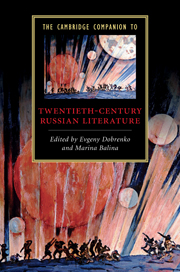Book contents
- Frontmatter
- 1 Poetry of the Silver Age
- 2 Prose between Symbolism and Realism
- 3 Poetry of the Revolution
- 4 Prose of the Revolution
- 5 Utopia and the Novel after the Revolution
- 6 Socialist Realism
- 7 Poetry after 1930
- 8 Russian Epic Novels of the Soviet Period
- 9 Prose after Stalin
- 10 Post-Soviet Literature between Realism and Postmodernism
- 11 Exile and Russian Literature
- 12 Drama and Theatre
- 13 Literature and Film
- 14 Literary Policies and Institutions
- 15 Russian Critical Theory
- Index
4 - Prose of the Revolution
Published online by Cambridge University Press: 28 May 2011
- Frontmatter
- 1 Poetry of the Silver Age
- 2 Prose between Symbolism and Realism
- 3 Poetry of the Revolution
- 4 Prose of the Revolution
- 5 Utopia and the Novel after the Revolution
- 6 Socialist Realism
- 7 Poetry after 1930
- 8 Russian Epic Novels of the Soviet Period
- 9 Prose after Stalin
- 10 Post-Soviet Literature between Realism and Postmodernism
- 11 Exile and Russian Literature
- 12 Drama and Theatre
- 13 Literature and Film
- 14 Literary Policies and Institutions
- 15 Russian Critical Theory
- Index
Summary
Revolution, writer, episode
The Revolution, taken episodically, appears quite insignificant. Where is the Revolution, then? Here lies the difficulty. Only he will overcome it who fully understands and feels the inner meaning of this episodic character and who will reveal the historic axis of crystallization that lies behind it. ‘Why do we need solid houses?’ the sect of Old Believers used to say. ‘We are awaiting the coming of Christ.’ Nor does this Revolution build solid houses; instead it concerns itself with resettlement [pereselenie], increases of residential density [uplotnenie], and construction of barracks. All of its institutions give the impression of being temporary, barrack-like. But not because it awaits the coming of Christ, that is, contrasts its final aim with the present process of building life, but because, on the contrary, it strives in endless gropings and experiments to find the best ways of building a house that is solid.
In a few charged sentences Trotsky offers his readers a remarkable reformulation of the entire Bolshevik project. An act of cosmic creation, it does not (we are told) derive its legitimacy from an infinitely deferred redemption – the arrival of a messianic age. Instead, its meaning must come from a particular kind of ongoing revelation. What the Revolution needs is someone who will explain it to itself by figuring out how the various pieces of the existential and ideological puzzle ought to fit together. And that someone must be a writer.
- Type
- Chapter
- Information
- Publisher: Cambridge University PressPrint publication year: 2011
- 1
- Cited by

